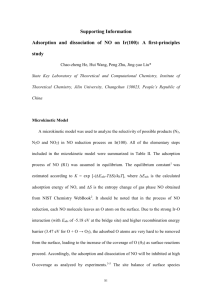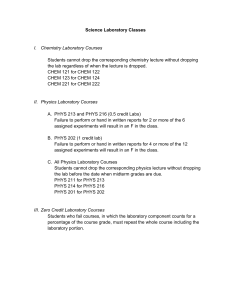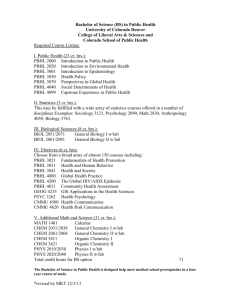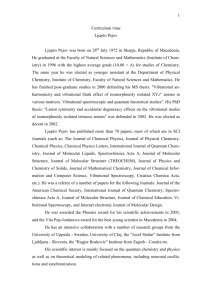Division of Chem..
advertisement
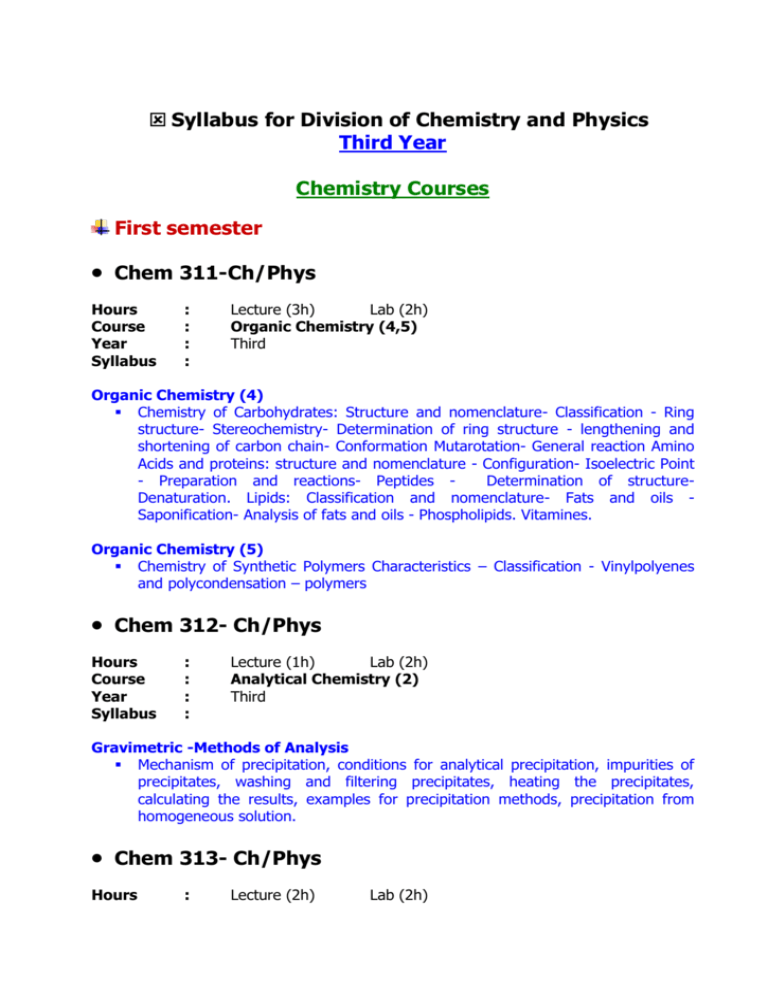
Syllabus for Division of Chemistry and Physics Third Year Chemistry Courses First semester Chem 311-Ch/Phys Hours Course Year Syllabus : : : : Lecture (3h) Lab (2h) Organic Chemistry (4,5) Third Organic Chemistry (4) Chemistry of Carbohydrates: Structure and nomenclature- Classification - Ring structure- Stereochemistry- Determination of ring structure - lengthening and shortening of carbon chain- Conformation Mutarotation- General reaction Amino Acids and proteins: structure and nomenclature - Configuration- Isoelectric Point - Preparation and reactions- Peptides Determination of structureDenaturation. Lipids: Classification and nomenclature- Fats and oils Saponification- Analysis of fats and oils - Phospholipids. Vitamines. Organic Chemistry (5) Chemistry of Synthetic Polymers Characteristics – Classification - Vinylpolyenes and polycondensation – polymers Chem 312- Ch/Phys Hours Course Year Syllabus : : : : Lecture (1h) Lab (2h) Analytical Chemistry (2) Third Gravimetric -Methods of Analysis Mechanism of precipitation, conditions for analytical precipitation, impurities of precipitates, washing and filtering precipitates, heating the precipitates, calculating the results, examples for precipitation methods, precipitation from homogeneous solution. Chem 313- Ch/Phys Hours : Lecture (2h) Lab (2h) Course Year Syllabus : : : Inorganic chemistry (4) Third Electronic structure of transition elements, bonding in transition elements, chemistry of titanium, vanadium, chromium, Mg, iron, Co, Ni, Cu, Zink, second and third transition series. Chem 314- Ch/Phys Hours Course Year Syllabus : : : : Lecture (2h) Lab (2h) Physical Chemistry (2) (A,B,C) Third A: Chemical Kinetics Introduction Reaction rate laws Determination of reaction order Complex reactions Theories of reaction rates Experimental techniques in chemical kinetics B: Surface and Catalysis Properties of liquid surfaces Properties of solid surfaces Adsorption Thermodynamics of adsorption Surface area determination Recent techniques in surface characterization Homogeneous and heterogeneous catalysis Kinetics of catalytic reactions Catalysis by enzymes C: Electrochemistry Reversible process Ionic strength Type of electrodes Chemical potential and activity concept Nernest equation arid its application Electrochemical cells Second semester Chem 321- Ch/Phys Hours Course Year Syllabus : : : : Lecture (3h) Lab (2h) Organic Chemistry (6,7) Third Organic Chemistry (6) Helerocyclic Chemistry: Classification and nomenclature of heterocyclic compoundsAroma( icty- pideficient and piexcessive heterocycles-Electrophilic and nucleophilic substitution reactions of heterocycles - Cycloaddition reactions - Synthesis of heterocycles. Organic Chemistry (7) Chemistry of Alicyrlic and Aromatic Hydrocarbons. Nomenclature- Synthesis -Reactions- Small ring compounds - Orbital picture of angle strain- Conformation and stability of cycldalkanes- Conformation analysis cyclohexane andits derivativesstereolsomerism-Structureand reactivity Stereochemistry of elimination from alicyclic compounds. Chemistry of systems such as biphenyl. Dyes and pigments classification and applications- Atropisonerism- Chemistry of naphthalene, anthracen, phenanthene and their derivatives. Chem 322- Ch/Phys Hours Course Year Syllabus : : : : Lecture (1h) Lab (2h) Analytical Chemistry (3) Third Spectrophotomtric Methods of Analysis Absorption of radiant energy, Beer's law, spectrophotometer, spectrophotometric methods. Molecular fluorescence and phosphorescence. Atomic absorption spectrophotometry (flame and flameless), atomic emission spectrophotometry, analytical and environmental applications. Chem 323- Ch/Phys Hours Course Year Syllabus : : : : Lecture (1h) Lab (2h) Inorganic Chemistry (5) Third Introduction, historical account of coordination chemistry, coordination bond, stereochemistry, preparation and reaction of coordinated compounds, complexion stability. Chem 324- Ch/Phys Hours Course Year Syllabus : : : : Lecture (3h) Lab (2h) Physical Chemistry (2) (D,E,F) Third D: Electrochemistry Irreversible process Electrochemistry processes under non- equilibrium conditions Concentration polarization Activation polarization Ohmic polarization Applications E: Colloidal Chemistry Introduction Thermodynamic foundation Statistical thermodynamic foundation Interaction Electrochemistry Transport phenomena Optics and applications F: Quantum Chemistry The failures of classical physics Dynamics of microscopic systems (Schrodinger equation) Translational motion Vibrational and rotational motion Hydrogen atom Atomic structure and atomic spectra Physics Courses First semester Phys 311- Ch/Phys Hours Course Year Syllabus : : : : Lecture (2h) Lab (2h) Solid state physics (1) Third Type of lattice imperfections in solids, Colour centres, Dislocation interactions, Classification and binding of solids: ionic covalent, molecular and metallic crystals, Lattice vibration, Phonons, Thermal properties of solids: classical, Einstein and Debby theories of heat capacity, Thermal conductivity, Thermal expansion, Magnetic properties: dia-, para-, ferro-, antiferro- and ferrimagnetism. Phys 312- Ch/Phys Hours Course Year Syllabus Lecture (2h) Lab (2h) Nuclear physics (1) Third The nucleus: proton-electron hypothesis and its failure, Angular momentum of nucleus, Discovery of neutron, Proton-neutron hypothesis, Magnetic and electric properties of nucleus, Natural radioactivity and isotopes, Mass spectrograph and spectrometer, Laws of radioactive transformation, -and -decay, Range-energy relations, Neutron, -rays: decay and interaction with matter, Nuclear binding energy, Nuclear stability, Energy levels of light nuclei, Nuclear models. Phys 313- Ch/Phys Hours Course Year Syllabus : : : : : : : : Lecture (2h) Reactor physics Third Lab (2h) Thermal neutrons and their energy distribution, Slowing-down power and moderating ratio of reactor neutrons, Nuclear chain reactions, Neutron cycle Multiplication and thermal utilization factor, Neutron leakage and critical size, Nuclear reactors, Power reactor control, Reactor shielding, Research reactors, Thermal neutron diffusion, Diffusion equation applied to thermal reactor, Critical equation and reactor buckling, Non leakage factors, Non steady nuclear reactors, Time dependent reactor equation, Excess reactivity and reactor period, Effect of delayed neutrons. Phy 314 - Ch/Phys Hours Course Year Syllabus : : : : Lecture (2h) Lab (2h) Quantum physics (1) Third Elements of non relativistic quantum mechanics, System of particle in one dimension, Hamiltonian operator, Schrodinger wave equation, Motion in central potential, Angular momentum, Spin and Pauli operators, Cmmutations, Heisenberg relation, Eigen values, Eigen function. Second semester Phys 321- Ch/Phys Hours Course Year Syllabus Lecture (2h) Modern optics Third Lab (2h) Optical boundaries, Fresnel’s equation, Shileren optics, Fibre optics, Fibe materials and manufacture, Integrated optics, Optical processing of images modulated by speckle, Holo-graphy, non linear optics. Phys 322- Ch/Phys Hours Course Year Syllabus : : : : : : : : Lecture (2h) Plasma physics Third Lab (2h) Plasma concepts and terminology, behavior of charged particles in electric and magnetic fields, Interaction of electromagnetic waves with plasma, magnetic and kinetic pressures Pinch effect, Plasma confinement by electric field and magnetic field, Plasma sheaths and Debye length, Collision and radiation in plasma, Plasma diagnostic techniques. Phys 323- Ch/Phys Hours Course Year Syllabus : : : : Lecture (2h) Lab (2h) Physical electronics (1) Third Alternating current circuits, Impedance, Plase graphical representation, Resonance, Semiconductor devices, Semiconductor diodes, Transistor construction, Transistor characteristics, Conversion formulas, Transistor biasing, Stabilization, Transistor in active, saturation and cut-off region, Single stage transistor amplifier, Frequency response, Multistage transistor amplifier, Clipping circuit, Rectifier, Electric filter, Electric net work theories, Three phase circuits. Phy 324 - Ch/Phys Hours Course Year Syllabus : : : : Lecture (2h) Special course Third Lab (2h) To be specified by the physics Department Mathematical Courses Second semester Math 320-Ch/Phys Hours Course Year Syllabus : : : : Lecture (1h) Lab (2h) Programming Languages Third Introduction to C++ Language Other Courses First semester Language 311-Ch/Phys Hours Course Year : : : Lecture (2h) Foreign Language (3) Third
